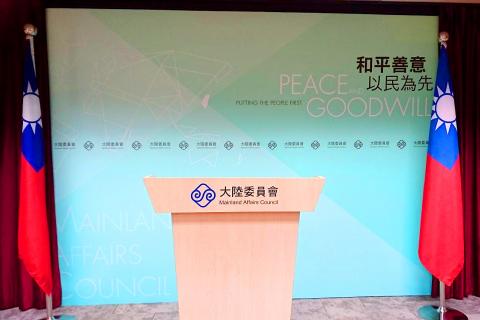The prison terms handed down to nine members of Hong Kong’s 2014 “Occupy Central” movement exposes the shortcomings of China’s “one country, two systems” framework, the Mainland Affairs Council (MAC) said yesterday.
The sentences were “regrettable” and proved that the “one country, two systems” framework cannot safeguard the public’s political rights, the council said in a statement.
“Occupy Central was a peaceful protest movement by Hong Kongers who were seeking democratic, universal franchise. For those participating to be met with criminal charges is deeply regrettable,” the council said.

Photo: Chung Li-hua, Taipei Times
The ability of Hong Kongers to use social movements to pursue democracy, rule of law and human rights is a priceless democratic asset and a driving force for their society, it said, adding that the territory’s administration should consider such movements beneficial in this era.
The territory’s leaders should respect and safeguard the politic rights of Hong Kongers, it said, adding that threatening citizens with criminal charges and denying them their rights only sidesteps a good opportunity to improve society.
China extols the virtues of the “one country, two systems” model, while simultaneously condensing the democratic autonomy, freedoms and rights of Hong Kongers, the council said.
The eyes of the world are on Hong Kong, it said, adding that Taiwanese would not be duped by Beijing.
Only by respecting the high degree of autonomy promised to Hong Kongers in the territory’s Basic Law would the territory’s governance conform to the principles of the rule of law and its development continue to prosper, the council said.
Representatives of the New Power Party and several human rights groups, some carrying yellow umbrellas, rallied outside the Hong Kong Economic, Trade and Cultural Office in Taipei to protest the prison terms, saying: “Shame on you, Hong Kong.”
“The ruling shows that the Hong Kong judiciary has completely lost its independence and that Beijing’s promise of ‘one country, two systems’ is a lie,” Taiwan Association for Human Rights secretary-general Chiu Ee-ling (邱伊翎) said.
The verdicts and sentences breached the International Covenant on Civil and Political Rights and Hong Kong’s Basic Law, she said.
From now on, any Hong Konger who advocates freedom and democracy could be jailed, Taiwan Association of University Professors vice secretary-general Chen Li-fu (陳俐甫) said, adding that Beijing has gone back on its pledge that Hong Kong would retain its established system under a high degree of autonomy for at least 50 years.
Its government should fight to protect Hong Kongers’ rights and ensure its judicial independence from Beijing’s influence, he said.
Two of the nine activists, University of Hong Kong law professor Benny Tai (戴耀廷) and Chinese University of Hong Kong sociology assistant professor Chan Kin-man (陳健民), issued individual statements expressing gratitude for Taiwan’s support.
It has become clear since the Umbrella movement that the Chinese Communist Party would come to exert complete jurisdiction over Hong Kong, while ignoring the territory’s autonomy and Hong Kongers’ political rights, Wong said.
“I believe that the people of Taiwan will understand what the ‘one country, two systems’ framework essentially is,” he said.
“I hope that the civil societies of China, Hong Kong and Taiwan can work more closely with each other in our fight against authoritarian regimes that aim to destroy democracy,” he said.

SECURITY: As China is ‘reshaping’ Hong Kong’s population, Taiwan must raise the eligibility threshold for applications from Hong Kongers, Chiu Chui-cheng said When Hong Kong and Macau citizens apply for residency in Taiwan, it would be under a new category that includes a “national security observation period,” Mainland Affairs Council (MAC) Minister Chiu Chui-cheng (邱垂正) said yesterday. President William Lai (賴清德) on March 13 announced 17 strategies to counter China’s aggression toward Taiwan, including incorporating national security considerations into the review process for residency applications from Hong Kong and Macau citizens. The situation in Hong Kong is constantly changing, Chiu said to media yesterday on the sidelines of the Taipei Technology Run hosted by the Taipei Neihu Technology Park Development Association. With

CARROT AND STICK: While unrelenting in its military threats, China attracted nearly 40,000 Taiwanese to over 400 business events last year Nearly 40,000 Taiwanese last year joined industry events in China, such as conferences and trade fairs, supported by the Chinese government, a study showed yesterday, as Beijing ramps up a charm offensive toward Taipei alongside military pressure. China has long taken a carrot-and-stick approach to Taiwan, threatening it with the prospect of military action while reaching out to those it believes are amenable to Beijing’s point of view. Taiwanese security officials are wary of what they see as Beijing’s influence campaigns to sway public opinion after Taipei and Beijing gradually resumed travel links halted by the COVID-19 pandemic, but the scale of

A US Marine Corps regiment equipped with Naval Strike Missiles (NSM) is set to participate in the upcoming Balikatan 25 exercise in the Luzon Strait, marking the system’s first-ever deployment in the Philippines. US and Philippine officials have separately confirmed that the Navy Marine Expeditionary Ship Interdiction System (NMESIS) — the mobile launch platform for the Naval Strike Missile — would take part in the joint exercise. The missiles are being deployed to “a strategic first island chain chokepoint” in the waters between Taiwan proper and the Philippines, US-based Naval News reported. “The Luzon Strait and Bashi Channel represent a critical access

Pope Francis is be laid to rest on Saturday after lying in state for three days in St Peter’s Basilica, where the faithful are expected to flock to pay their respects to history’s first Latin American pontiff. The cardinals met yesterday in the Vatican’s synod hall to chart the next steps before a conclave begins to choose Francis’ successor, as condolences poured in from around the world. According to current norms, the conclave must begin between May 5 and 10. The cardinals set the funeral for Saturday at 10am in St Peter’s Square, to be celebrated by the dean of the College